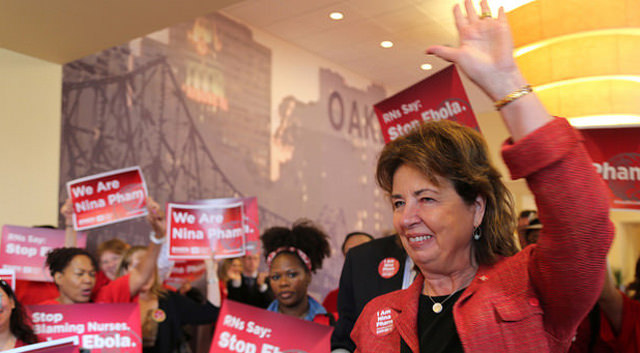Blog
Help Stop Ebola--Tell Congress and the White House to Order Hospitals to Put Safety Standards First

Now that nurses, who have been sounding the alarm about Ebola for more than two months, finally have the attention of policy makers and everyone else, let's have no more excuses and take the critical steps needed to contain and eradicate this virulent disease in the U.S. and globally.
You can help this effort by adding your voice to our new national petition, here.
In the U.S., long experience with our privately-run corporate hospital chains that dominate care delivery have made one sober reality abundantly clear -- unless the health care industry is mandated to put the safety of patients, nurses, and other caregivers above their profit motive, the Ebola threat will only get worse.
That's why we are asking all Americans to join us. Sign our online petition to tell Congress and the White House to mandate all hospitals follow the highest safety standards and protocols for Ebola - and if they don't, you control their Medicare and Medicaid fund, the lever for a penalty for failure to comply.
Since Thomas Eric Duncan first walked into Texas Health Presbyterian, the hospital that sent him home despite being infected with an Ebola virus that would kill him just a few days later, the nation's hospitals have continued to move slowly in adopting proper safety precautions - while paying little more than lip service to unenforceable recommendations from the Centers for Disease Control that have seemed to change every day.
Two Texas Presbyterian RNs, Nina Pham and Amber Vinson, who were subsequently infected with the virus must be the last nurses forced to pay the price of the lagging response of our hospitals.
The CDC now, finally, appears to be moving closer to what NNU has been long been calling for. That means the optimal protective equipment, including Hazmat suits as used by Nebraska Medical Center and other premiere institutions, and continuous interactive hands-on training for RNs and other frontline health workers, including practice, in teams, putting on and taking off the proper protective gear.
But the CDC still does not have the authority to compel hospitals, which have repeatedly shown they will pick and choose whatever protocols they like, usually based on their budget goals and profit margins.
It is essential, therefore, that we have an act of Congress or Presidential executive order, with their federal funding as a stick, to override that profit imperative.
More than 3,000 nurses from 800 health facilities in 48 states and the District of Columbia have responded to an NNU Ebola survey. A chilling 84 percent say their hospital is still not holding the essential, interactive training programs, and more than a third cite inadequate supplies of protective gear.
What that -- and verbal and email reports we are hearing from RNs from coast to coast amplify -- clearly signals is that what happened at Texas Health Presbyterian is a story that could be told in every hospital in this country. As nurses are now telling us, "we all work at Texas Presbyterian."
Simply put, the status quo is indefensible if it puts nurses, other frontline health care workers, and patients' lives in jeopardy. As the horrific experience in West Africa where thousands have now died from Ebola, including nurses and other health workers in what the World Health Organization calls "unprecedented" numbers, our nurses and other caregivers should not have to put their lives on the line for the failure of our policy makers to protect them.
We have the resources, just not the right national priorities.
Hospitals are a multi-billion industry in the U.S. Texas Health Presbyterian is part of a 25 facility corporate chain that made over $2 billion in profits the past five years. They could have been better prepared.
The drug giants are even wealthier. The past five years, global pharmaceutical corporations made nearly $600 billion in profits, enough to buy 1.8 billion Hazmat suits for every health care worker in the U.S. and West Africa, with a lot left over in reserve. The drug giants could have developed a vaccine or even a cure for Ebola, but apparently it wasn't profitable enough.
Neo-liberal economists and politicians have for several decades employed what writer Naomi Klein called the "shock doctrine" in economic or political crises to push through sweeping policy changes that benefit the elite.
Now may be a moment for those who favor humanitarian social reform to say it is time to change our national priorities as well, starting with the overall direction of health care in the U.S.
Not one more nurse, not one more health care worker, not one more patient should be sacrificed on the altar of profit. We need a health care system, not an industry, that puts public health and patient need first, that is the only way to stop Ebola, and the other pandemics that are sure to follow.
In a conversation with me this week, MSNBC's Chis Hayes concluded that the fractured Ebola experience is a reminder of why nurses especially need power and a voice, and today, we're seeing the consequences of not listening to people on the frontline.